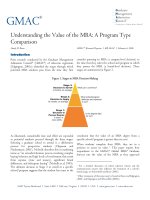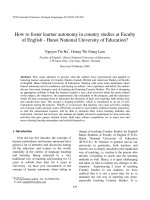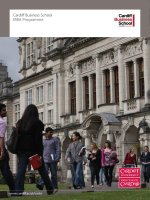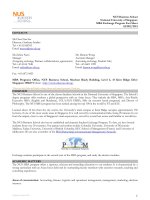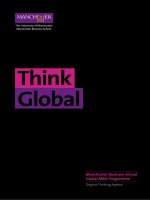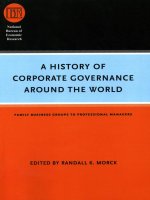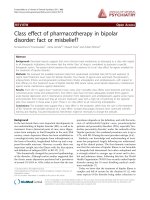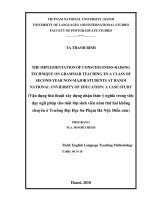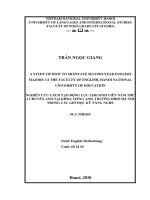NUS Business School National University of Singapore MBA Exchange Program Fact Sheet AY2012/2013 pptx
Bạn đang xem bản rút gọn của tài liệu. Xem và tải ngay bản đầy đủ của tài liệu tại đây (423.27 KB, 7 trang )
Updated November, 2011
1
NUS Business School
National University of Singapore
MBA Exchange Program Fact Sheet
AY2012/2013
CONTACTS
Ms Chua Nan Sze
Director, Graduate Studies
Tel: +65 65168763
Email:
Ms Zahira Nawi
Mr. Damon Wong
Manager
(Outgoing exchange, Partners collaborations, agreements)
Assistant Manager
(Incoming exchange, Student Life)
Tel: +65 6516 7848
Tel: +65 6601 1909
Email:
Email:
Fax: +65 6872 4423
MBA Programs Office, NUS Business School, Mochtar Riady Building, Level 4, 15 Kent Ridge Drive
Singapore 119245 Website:
*Please note that Zahira will handle exchange balances and renewal agreements. Thank you.
OVERVIEW
The NUS Business School is one of the eleven faculties/schools in the National University of Singapore. The School’s
degree programs offer students a global perspective with an Asian focus. They include the BBA, MBA, Asia-Pacific
Executive MBA (English and Mandarin), UCLA-NUS EMBA, MSc (in research based programs) and Doctor of
Philosophy. The NUS MBA program has been ranked among the top 100 in the world by FT and EIU.
Located about 12 km from the city centre, the University's main campus at Kent Ridge occupies approximately 150
hectares of one of the most scenic areas in Singapore. It is well served by communication links, being 20 minutes by car
from the airport, close to one of Singapore's main expressways, served by several bus routes and familiar to taxi drivers.
The NUS Business School also has an established and dynamic Student Exchange Program. To date, we have hosted
students from over 30 countries. Our partner universities include Columbia University, University of Wisconsin-
Madison, Fudan University, University of British Columbia, HEC School of Management (France) and University of
Melbourne. We are also a member of the PIM (Partnership in International Management) Network.
Exchange students participate in the second year of the MBA program, and study the elective modules.
ACADEMIC MATTERS
The NUS MBA program offers a rigorous, relevant and rewarding education to our students. It is characterized by a
strong curriculum with an Asian focus delivered by outstanding faculty members with extensive research, teaching and
consulting experiences.
Areas of concentration: Accounting, finance, logistics and operations management, management, marketing, decision
sciences.
Updated November, 2011
2
Structure and Delivery of Classes:
Language of instruction: English
Teaching Methods: A variety: including lectures, case studies, presentations, project work, computer-
based business games, multi-media tools and field trips. Students are expected to
participate in class discussions
Class size: 15-40 students in elective courses
Course load: 4 Credits per module. 42 lecture hours per module. Recommended 4-5 modules
Grading: A-F
Examinations: as per instructor
Course Outlines
The module outlines are made available on website:
Go to Current Students/Curriculum/Timetable
Select Academic Year
Select Semester for more information.
Exchange students should select from the list of elective modules offered.
Modules and Credit Transfer
Exchange students must take a minimum of 3 modules (12-modular credits) and can take a maximum of 5 modules. (20-modular
credits). Exchange students are responsible for verifying with their home universities that their modules can be transferred back as
credits to fulfill their degree requirements. Please be advised that exchange students are required to take exams for all the
examinable modules they are reading.
Real Estate Modules
A fee of S$2,500 (per module) will be charged to exchange students who wish to read modules at the Department of
Real Estate (School of Design and Environment).
Health Care Management Modules
A fee of S$1,350 (per module) will be charged to exchange students who wish to read modules at the Department of
Epidemiology and Public Health (Yong Loo Lin School of Medicine).
Examination Dates
MBA Office determines the examination dates for MBA modules. Request for taking early exam will not be entertained.
Examination Results
Online results will be available one month after the last examination date. Request for early result release will not be
entertained.
For Exchange students, two copies of your transcript (one of which is a complimentary copy for the student) will be sent directly to
the relevant offices of your home university responsible for student exchange program; approximately two months after the
Updated November, 2011
3
completion of the semester (unless otherwise arranged with the partner university). You will have to make your own arrangements
to collect your complimentary transcript from the relevant office(s) at your home university.
Faculty
The school has a rich international flavor as many of its faculty hail from different parts of the world. Over the last
three decades, we have become the top choice business school in the Asia-Pacific region. This is possible with the
120-strong teaching staff in our school who regularly publish state-of-the-art research in leading journals. About 90% of
them obtained their PhDs from reputable US and overseas universities. Many of our staff members have professional
qualifications, work and consultancy experiences that are valuable in enriching the learning experience of our students
and program participants.
Facilities at the NUS Business School
Facilities at NUS are vast and modern and include the Hon Sui Sen Memorial Library, which houses the Management
Collection of 40,000 volumes. This library is part of the University library system comprised of six libraries with a total
combined collection of over 1.89 million books and bound journals. The libraries also have a substantial collection of
microfilms, CD-ROM databases, and periodicals. State-of-the-art behavioral laboratories, computer labs, and
conference rooms also are at the students’ disposal. NUS also offers wireless internet access campus-wide.
Career Services
NUS Career Service Office provides several services to exchange students.
These services include:
Meeting with Career Advisors (by appointment only)
Resume Critiques, letter writing (by appointment only)
Mock interview application, interview skills (by appointment only)
On-campus recruitment/presentations
Career Workshops
Career Fair
Access to alumni-related functions; all exchange students will be part of the NUS Business School alumni upon
completion of an exchange semester in NUS.
ADMINISTRATIVE MATTERS
NUS Term Dates & Deadlines
National University of Singapore
Fall Term
Spring Term
Special Term
Orientation Week *
06 to 11 August, 2012
07 to 11 Jan, 2013
06 to 10 May, 2013
Start Date
13 August, 2012
14 January, 2013
13 May, 2013
End Date
8 December, 2012
11 May, 2013
03 Aug, 2013
Nomination Deadline
(for Coordinators)
01 April, 2012
15 September, 2012
15 February, 2013
Application Deadline
(for Nominated Students)
15 April, 2012
01 October, 2012
1 March, 2013
Supporting Documents Submission
Deadline (for Nominated Students)
01 May, 2012
15 October, 2012
15 March, 2013
*includes Pre-Registration with Registrar Office
Academic Calendar:
Online Application can be found on this website:
Please read the Notes for Application carefully and send all application forms and supporting documents to the
Registrar’s Office as instructed.
Updated November, 2011
4
Admission Requirements: Exchange students from SEP partner universities must:
1. be proficient in the English language in order to benefit from their studies at NUS, as the medium of
instruction in NUS in English (except for Asian or European studies, where a good command of the respective
Asian or European language is a prerequisite)
2. be academically qualified for the graduate course-work they wish to pursue at NUS
3. fulfill any requirements under the SEP MOU; and
4. fulfill any prerequisites for the coursework that they wish to pursue (eg ensure that pre-requisites for modules
selected are met)
Visa Details
No visa for entry into Singapore is required for nationals from countries that have full and open diplomatic and travel
links with Singapore (eg, Australia, Germany, Japan, United States of America, Indonesia etc.)
A “visa for entry” into Singapore is required for nationals from countries that do not have full and open diplomatic and
travel links with Singapore (eg, Afghanistan, Commonwealth of Independent States, India, Laos, Myanmar, People’s
Republic of China, Syria, Yemen etc)
In such cases:
(i) the Registrar’s Office (RO) will (upon receipt of the Application Form) submit a request to the
Immigration & Checkpoints Authority (ICA) for the candidate to be issued a visa for entry into Singapore;
(ii) upon clearance, the RO will be issued the original ICA in-principle approval letter to enter Singapore;
(iii) the original ICA in-principle approval letter will be sent to the candidate, together with the offer letter and
other documents; and
(iv) the exchange student must present the original approval letter, together with the offer letter, to the ICA
official at the point of entry into Singapore.
IMPORTANT: Partner Universities who have selected candidates whose nationalities fall under this category
must submit the completed application form to the Registrar’s Office by official deadline. This is to ensure
that there is sufficient time for ICA to grant the approval for the visa.
The ICA’s homepage at provides a list of nationals from countries that
require a visa for entry into Singapore.
Medical & Insurance Matters
It is compulsory for ALL full-time Non-graduating (exchange/non-exchange) students to take up the NUS Health
Insurance Scheme. The GMIS comprises 3 components:
Hospitalization, Surgical & Mental Health
Personal Accident
Outpatient Specialist Care
Click HERE for details of GMIS as well as information on claims procedures. Please note health services NOT covered by
GMIS are for example General Practitioner outpatient consultation & treatment, pre-existing conditions or dental
consultation. You may wish to enroll with a private health insurance organization that offers services not covered by GMIS.
The premium payable is $58.85 (inclusive of GST) per semester or $10.00 (inclusive of GST) per month.
Please note that there is no refund of paid premiums.
Payment may be made by Cash*/NETS or Credit Card (Visa/Master/Amex)
Payment by CASH/NETS must be made personally.
Please use the fee payment form, obtainable during Registration and make payment at the Student Services Centre,
located at Yusof Ishak House Level 1, No. 31 Lower Kent Ridge Road Singapore 119078 during the following hours
9:00am to 5:00pm (Monday to Friday).
Updated November, 2011
5
Events before start of semester
Pre-Registration by Registrar Office
It is compulsory for students to attend Pre-Registration with Registrar Office (RO). Please refer to Page 2; an example
of Pre-Registration dates/activities Here, you
will meet with the officers from RO and they will guide you individually on how to obtain your Student Pass amongst
other administrative matters. The officers from Immigration & Checkpoints Authority (ICA) will also be present to
assist exchange students.
Orientation by MBA Programs Office, NUS Business School
It is compulsory for students to attend the Orientation held by MBA Programs Office. Here, we will introduce you to
NUS Business School; there will be briefings on Academic matters (e.g. adding and dropping of modules), Integrated
Virtual Learning Environment (IVLE), Library, Business school tour and meetings with our Vice-Dean, Academic
Director and staff of MBA Programs Office.
Orientation by Office of Student Affairs
It is optional for students to attend the Orientation held by Office of Student Affairs. Here, OSA will assist exchange
students assimilate into student life in NUS. This area will be covered by MBA Programs Office.
Housing on Campus
Exchange students may apply for the on-campus accommodation; please view
for more information. You may also click here to view
the private accommodation options.
Student Services Available
Library facilities, banking facilities, postal services, computer services, telephone services, sports and recreation facilities,
health service, canteen facilities.
Estimated Monthly Expenses (SGD)
Accommodation (rental)
: Public housing apartment
$1,500 to $3,000
Room
$400 to $1,000
Transportation
: Taxis $8 to $24 per trip
MRT/Buses $0.71 to $2.80 per trip
Utilities
: $80 to $400 (Varying based on usage)
Meals
: Low end restaurants ($15 upwards per head a meal)
Hawker centres/food courts/fast food ($5 upwards per head a meal)
Groceries
: From $150
Entertainment
: Clubbing and drinks $35 upwards per night
Cable TV $30 upwards
Communications
: Mobile phone plans $19.95 to $200
Broadband $19.95 to $208
About
Singapore
:
Location The Republic of Singapore is a tropical island with 64 surrounding islets, which together form
a total land area of 682.3 sq. km (168,603 acres). It is situated between latitudes 1º 09´N and 1º 29´N and longitudes
103º 36´E and 104º 25´E. Singapore has a very strategic location, which could be used as an ideal base for students who
wish to travel in the nearby Southeast Asian region. Singapore it is also known to offer the best quality of life in the
Asian region.
Updated November, 2011
6
History The name Singapore is derived from the word “Singapura” or “Lion City” as legend has it that
a Sumatran prince sighted a beast which looked like a lion when he first set foot on the island in the 14th century. In
the year 1819, Sir Stamford Raffles established a British trading station on this island. Singapore gained its
independence as a sovereign and democratic nation on 9 August 1965. It was admitted to both the United Nations and
the Commonwealth of Nations in the same year.
National Symbols
Climate Singapore is an equatorial country with relatively uniform temperature, high humidity all year
round and abundant rainfall particularly during the Northeast Monsoon from November to January. It has relatively
high temperatures with a daily average of 26.7°C and a high daily relative humidity of approximately 84.4%.
People Singapore has a population of 4.2 million which comprising of Chinese (77%), Malays (14%),
Indians, (7.6%) and other races (1.4%). There are 4 official languages - Malay, Chinese (Mandarin), Tamil and English.
While Malay is the national language, English is the language of administration as well as the medium of instruction in
schools and other educational institutions. The National Anthem is sung in the Malay language.
Festivals As a melting pot of many cultures, Singapore enjoys many colourful festivals. The Chinese
celebrate Chinese New Year, the Dragon Boat Festival and the Mid Autumn Festival with mouth watering delicacies
created just for those occasions. The Muslims look forward to Hari Raya Puasa & Hari Raya Adilfitri, and the Hindus
have Thaipusam and Deepavali. These festivals are occasions for all Singaporeans to come together to share their
culture and traditions - visitors are welcome to join us! To find out more about festivals in Singapore, please visit
Lively Arts Scene Singapore is a City for the Arts. We have a burgeoning arts scene and there are
drama, music and dance performances all year round at various locations, culminating in the Singapore Arts Festival in
June. Catch some of our free road shows and performances at the local gardens and parks. To find out more about
Singapore arts performances and activities, please visit
Food Paradise Singapore is indeed a gourmet’s paradise, offering a cosmopolitan range of cuisines ranging
from Mongolian to South African and Japanese to a host of European choices. Of course, you should not miss
Singapore’s famed local specialities, Chilli Crab and Hainanese Chicken Rice. You should also try Laksa (rice noodles in
coconut curry gravy with shrimp, egg and chicken as garnishing) and Nasi Padang (rice with various spicy dishes). For casual dining, eat
at a kopitiam which is a traditional type of coffee shop serving a large variety of local food. For breakfast, order some
Kaya (sweet coconut egg jam) on charcoal-toasted bread and enjoy with a cup of local coffee. Another great combination is
roti prata (Indian pancake) and teh tarik (“pulled” tea). Find out more about these interesting culinary delights from
Shopping Paradise Besides being a food paradise, Singapore is also a shopper’s paradise. Have fun buying
everything from arts and crafts, antiques, gold-plated orchids, electronic goods, computer software to the hottest
fashion! Check out the shopping list from .
The lion head is the
national symbol of
courage, strength and
excellence.
The Vanda Miss Joaquim is
the national flower which
epitomizes Singapore's quest
for progress and excellence
in all aspects of life.
Our National Flag consists of
two equal horizontal sections,
red above white. In the upper
left canton is a white crescent
moon beside five white stars
within a circle.
Updated November, 2011
7
Places of Interest There are many places of interest including Chinatown, Little India, Jurong Bird Park (with
the world's largest Southeast Asian bird collection), the Night Safari, the Singapore Zoological Gardens and the
Singapore Science Centre. Sentosa Island is a resort island which is accessible by bus, cable car or ferry. It has a lot of
attractions including Underwater World (Asia's largest tropical oceanarium), Volcano Land and Universal Studios. For
more information, please visit
Others Singapore is a favourite stopover for tourists bound for distant destinations as well as nearby
tropical resorts. Explore the region while you are here! It takes less than 3 hours to fly to Kuala Lumpur (Malaysia),
Bangkok (Thailand), Ho Chi Minh City (Vietnam), Jakarta (Indonesia) and Yangon (Myanmar).
For a comprehensive guide for the student who wants to capture the entire panoramic sweep of sights and sounds of
Singapore, please refer to the official website for tourist information in Singapore.

